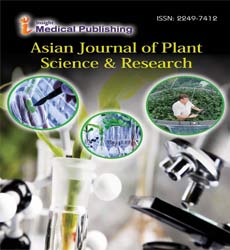ISSN : 2249 - 7412
Asian Journal of Plant Science & Research
Mitigation of Stubble Burning Through Custom Hiring Centers in Punjab
Abstract
Rice wheat cropping system of the South Asia is labour, capital and energy intensive and become less profitable as the availability of these resources diminishing. This cropping system is dominant in most Indian states, such as Punjab, Haryana and U.P etc. India produces more than 500 million tons (Mt) of crop residues annually. Generation of cereal residues is highest in Uttar Pradesh (53 Mt) followed by Punjab (44 Mt) and West Bengal (33 Mt) etc Residue burning Punjab 19.65MT is ranked first followed by U.P. 11.92MT, Haryana 9.08MT. In Indian agriculture mechanical power is largely consumed by mainly large farmers. Therefore in order to bring farm machinery available to small/marginal Farmers, concept of Custom Hiring Centers is developed. The CHCs providing farm equipments and on rental basis to farmers, who cannot afford to purchase costly equipments. The proposed study will be carried out purposively in Punjab state. Out of twenty two districts three districts (Ludhiana, Sangrur, Moga) will be selected purposively due to highest stubble burning in last five years and highest number of primary agricultural co-operative society that provide custom hiring services to farmers, then from each district two block will be selected randomly. Subsequently, three villages from each block will be randomly selected. Finally from each village 10 respondents will be selected randomly. For this study the respondents will be the farmers who are taking services from the custom hiring centres for at least one year. Thus total sample size for present study will be 180 farmers. Data were collected through well-structured and pre-tested interview schedule. The study revealed Except burning, management of crop residue with happy seeder/ Zero till drill and removal of crop residue from field are major practices followed by the farmers. Most of the farmers had medium utilization of custom hiring centres for mitigation of stubble burning, happy seeder and paddy straw chopper machines was the most utilized by the farmers for management of stubble. Majority of the farmers had favorable attitude towards custom hiring centres, also farmers perceives that Machines having high demand during the peak seasons should be more in number in the societies. Those machines which are of least demand should be replaced by machines with high demand. Majority of the farmers had medium level of training need for stubble management. so CHCs and other agencies should organized more training programme on residue management in collaboration with ICAR research Institutes, Agriculture universities, Veterinary university and KVKs. Major strength of CHCs is that it help in reducing cost of cultivation and major weakness of CHCs is that High initial cost in establishment of CHCs and major opportunity of CHCs is that farmer are independence in choosing required machine and Major threat of CHCs is that Poor infrastructure available to most of farmers in establishment of CHCs.

Open Access Journals
- Aquaculture & Veterinary Science
- Chemistry & Chemical Sciences
- Clinical Sciences
- Engineering
- General Science
- Genetics & Molecular Biology
- Health Care & Nursing
- Immunology & Microbiology
- Materials Science
- Mathematics & Physics
- Medical Sciences
- Neurology & Psychiatry
- Oncology & Cancer Science
- Pharmaceutical Sciences
